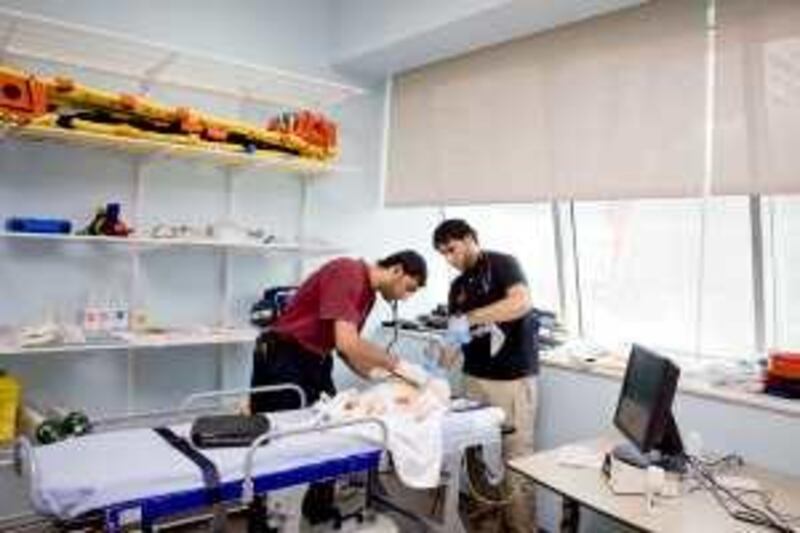ABU DHABI // Ahmad Hammadi was trying to save a little girl's life. The 22-year-old paramedic student was attending to the youngest of three sisters who had been hit by a car. She was not breathing. As a doctor arrived at the scene, Mr Hammadi shouted: "The kid here might still have a chance to survive!"
This tragic scene unfolded in July last year when three Emirati sisters were killed as they crossed the street with their nannies. The heart-wrenching experience was part of Mr Hammadi's education as he trains to be a paramedic, along with 15 other Emiratis, including six women. All are taking a four-year bachelor's degree course for paramedics which includes a month of on-the-job training with emergency services personnel.
The programme, the first in Abu Dhabi, is part of a wide-ranging effort to improve the quality of ambulance service in the emirate and meet a surge in demand for pre-hospital health workers. They all hope to graduate next year. When they complete their degree, the students will have studied paramedic science, worked for one month each year in the Abu Dhabi Police ambulance department and spent one day a week in hospitals.
The trainees will also have been sent abroad to take examinations and work with emergency medical teams in the US and Australia. The students are in their third year and can perform "intermediate" tasks on the road, such as establishing intravenous (IV) lines, and some "advanced" procedures, such as stabilising patients with back injuries so they can be moved to the hospital. Current paramedics must take new exams as part of the reassessment of the service by the authority.
"Anyone applying for a paramedic job in the department must now be certified by the Health Authority before processing their application," said Col Mohammed al Naimi, the head of the Abu Dhabi Emergency and Public Safety Department. The programme's goal of bringing highly trained Emiratis to the ambulance service has become even more urgent because of increasing population, city expansion and the high number of road accidents. "There is a big demand on paramedics," said one police officer. "Not only here. There is a universal demand."
A major issue contributing to the shortage is the tendency of paramedics to leave the profession because of stress. Research has found that the average career for a paramedic, worldwide, is about seven years. "Things like post-traumatic stress disorder are a big problem for emergency services," said Nate Puckeridge, a paramedic faculty member at the Health Sciences Department of the Higher Colleges of Technology.
"Once you train a person up and get them qualified, to retain them can be quite a big challenge for ambulance services anywhere." Latifa al Muntheri, 22, of Abu Dhabi, said the two cases she attended caused her to lose sleep. One involved an Indian women who died of cardiac arrest two months ago and another was tending to one of the three sisters who were killed in a traffic accident in July. She was at the scene with Mr Hammadi.
"It was difficult for me to get used to it," said Ms Muntheri, who is determined to continue. "I was scared when I started to see injuries; I was almost destroyed when one of the patients died." Auston Balon-Rotheram, the strategic adviser for the city's emergency department, said that paramedics need a tough disposition. "Paramedics do a very complex and difficult job," he said. "You have maybe two paramedics going out to two or three patients, unlike in a hospital where there are a dozen people to help. So a paramedic requires very special skills to do the job properly."
Witnessing the scene where three sisters were killed in a traffic accident gave Mr Hammadi and Ms al Muntheri sleepless nights. But the more suffering they see, the more determined they are to learn, and be able to help.
hhassan@thenational.ae





